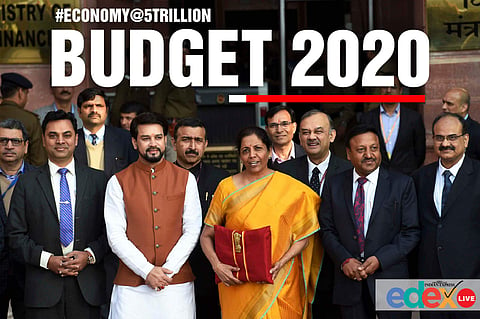

Presenting her second Union Budget as the Finance Minister, Nirmala Sitharaman, on Saturday said that GST has integrated the entire nation and helped the average family save around 4 per cent of its monthly spending. She also added that India now has 60 lakh more taxpayers and 40 crore GST returns were filed in this financial year through 800 crore invoices.
Lauding the Modi government for its 6 year-long governance, the Finance Minister added that this Budget is for the people. "Guided by Sabka Saath, Sabka Vikas, Sabka Vishwas, our government scaled up the implementation of schemes that directly benefited the poor and disadvantaged", said the FM. "There has been a paradigm shift in governance. We shall strive to bring ease of living to every citizen. Between 2006-16, India was able to pull 271 million people out of poverty. The milestones achieved under Modi government have been unprecedented and were globally recognised," she added.
Finance Minister Nirmala Sitharaman presented the Union Budget 2020 at the Lok Sabha on February 1, 2020, at 11 am. This budget is Prime Minister Narendra Modi’s second opportunity in seven months to refresh policy priorities to support an economy on a downward spiral. The Economic Survey that was released on January 31, a day before, projected India's economic growth at 6 per cent to 6.5 per cent in the next financial year starting April 1, saying growth has bottomed out. The growth in 2020-21 compares to a projected 5 per cent expansion in 2019-20.
Weak global growth impacting India, as well as investment slowdown due to financial sector issues, had led to growth dropping to a decade low in current fiscal, said the survey, adding 5 per cent growth projected for 2019-20 is the lowest it could fall for now.
The survey that sets the premise of the Union Budget, said that along with efforts for generating additional employment, special focus has been on improving quality of jobs and formalisation of the economy. The share of regular wage or salaried employees has increased by 5 percentage points from 18 per cent in 2011-12 to 23 per cent in 2017-18. In absolute terms, there was a significant jump of around 2.62 crore new jobs with 1.21 crore in rural areas and 1.39 crore in urban areas in this category.
The survey also introduced Thalinomics to Indians — the affordability of Thalis vis-à-vis a day’s pay of a worker, which has improved over time, indicating improved welfare of the common person. The survey stated that affordability of vegetarian Thalis improved 29 per cent from 2006-07 to 2019-20 while that for non-vegetarian Thalis by 18 per cent.
